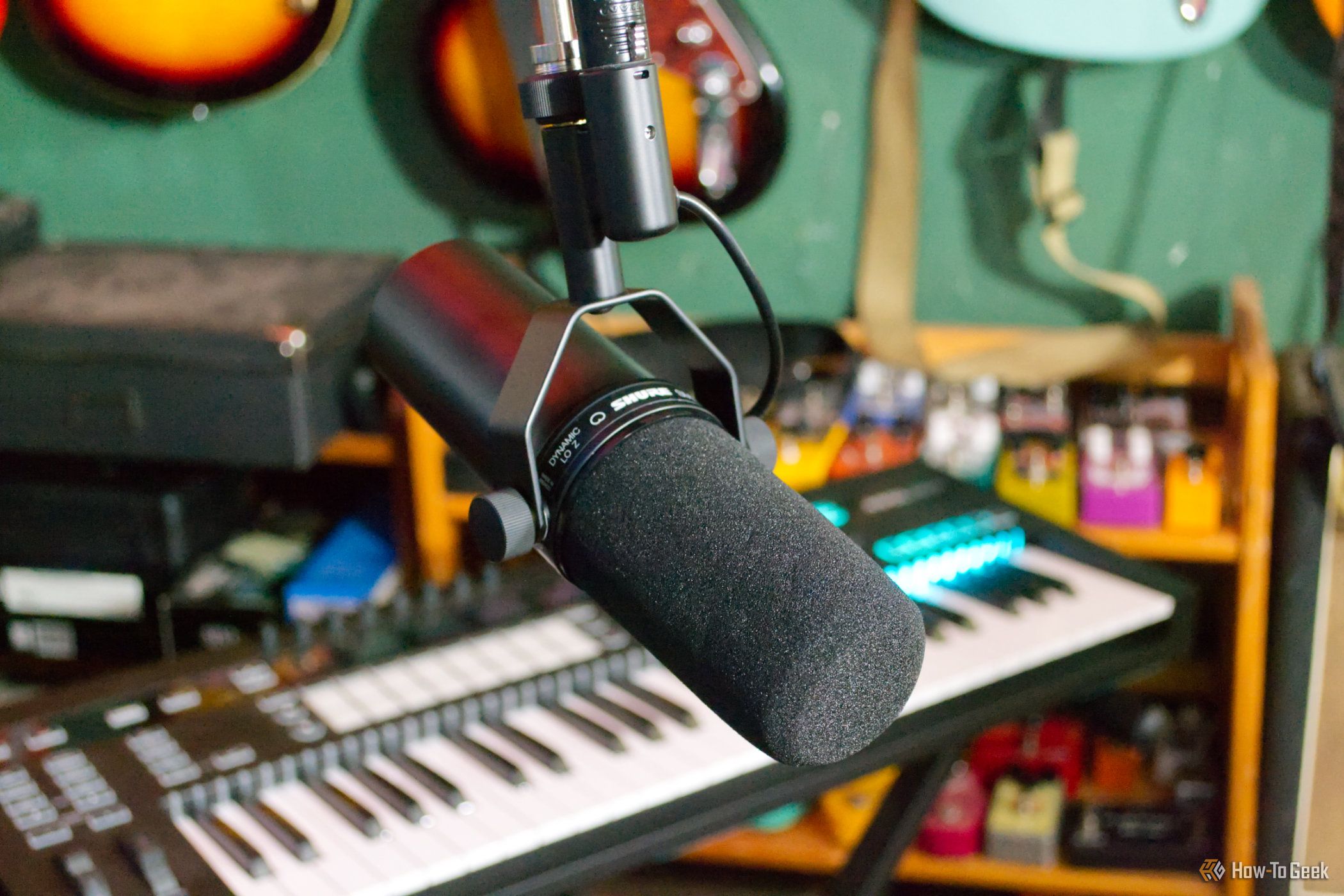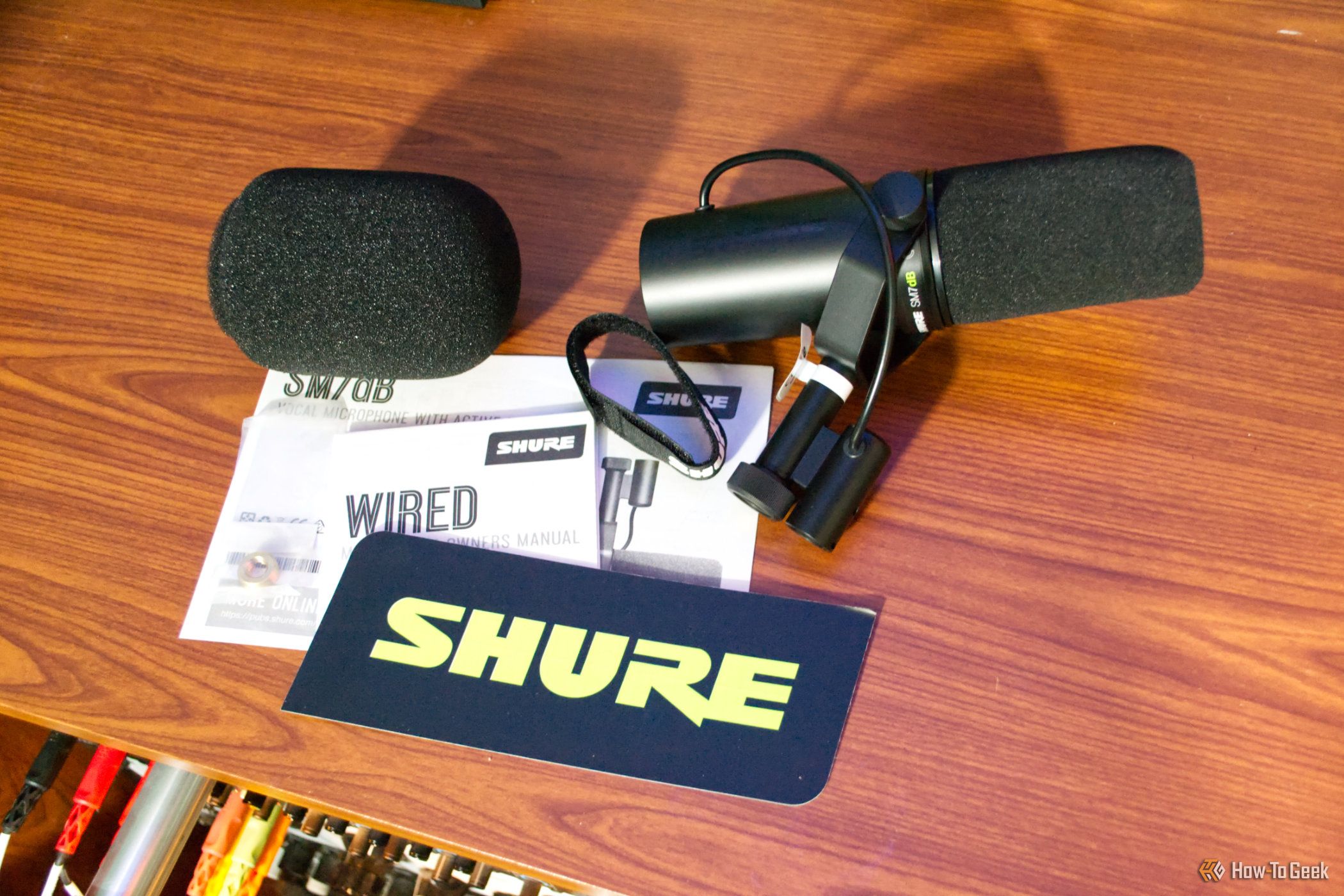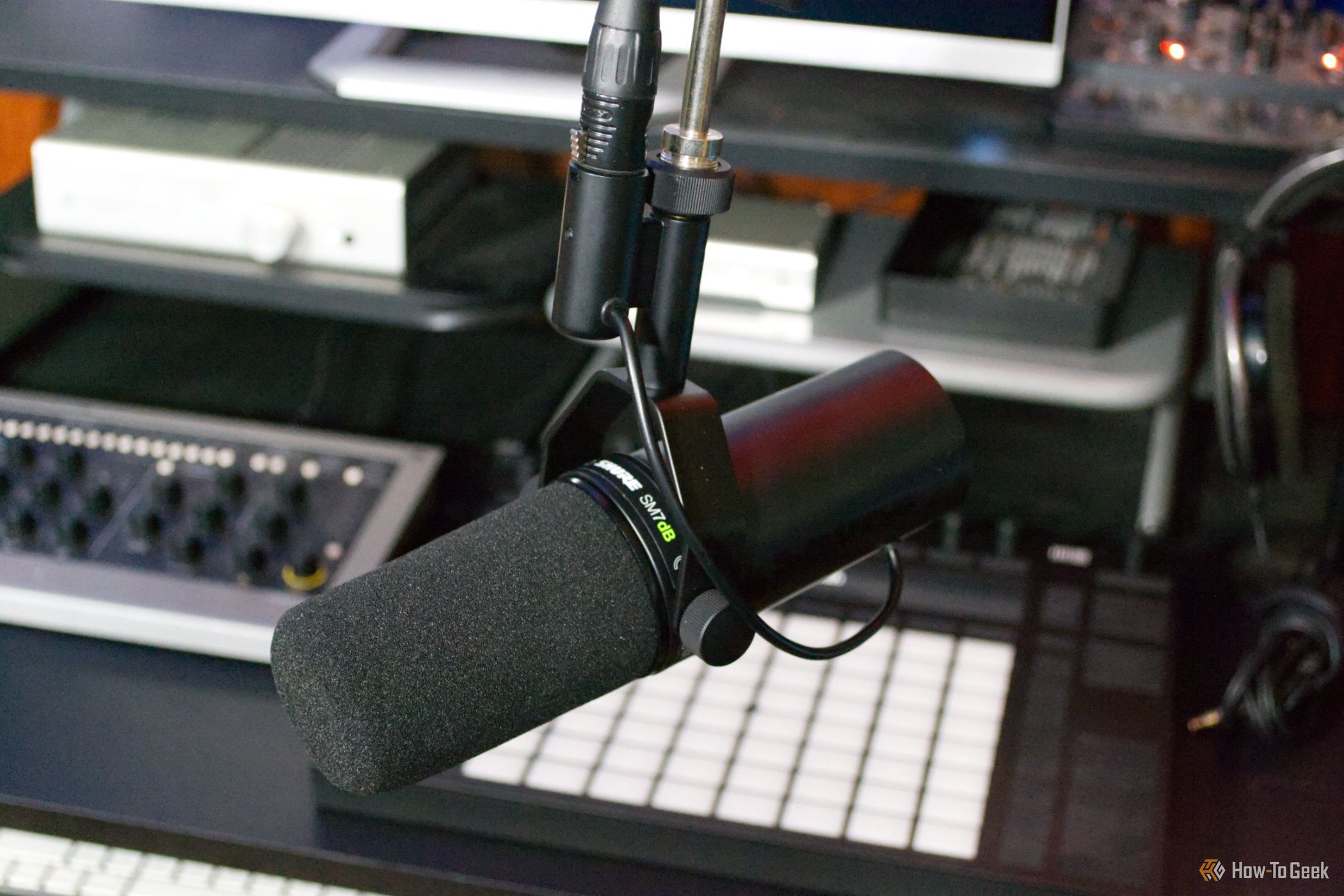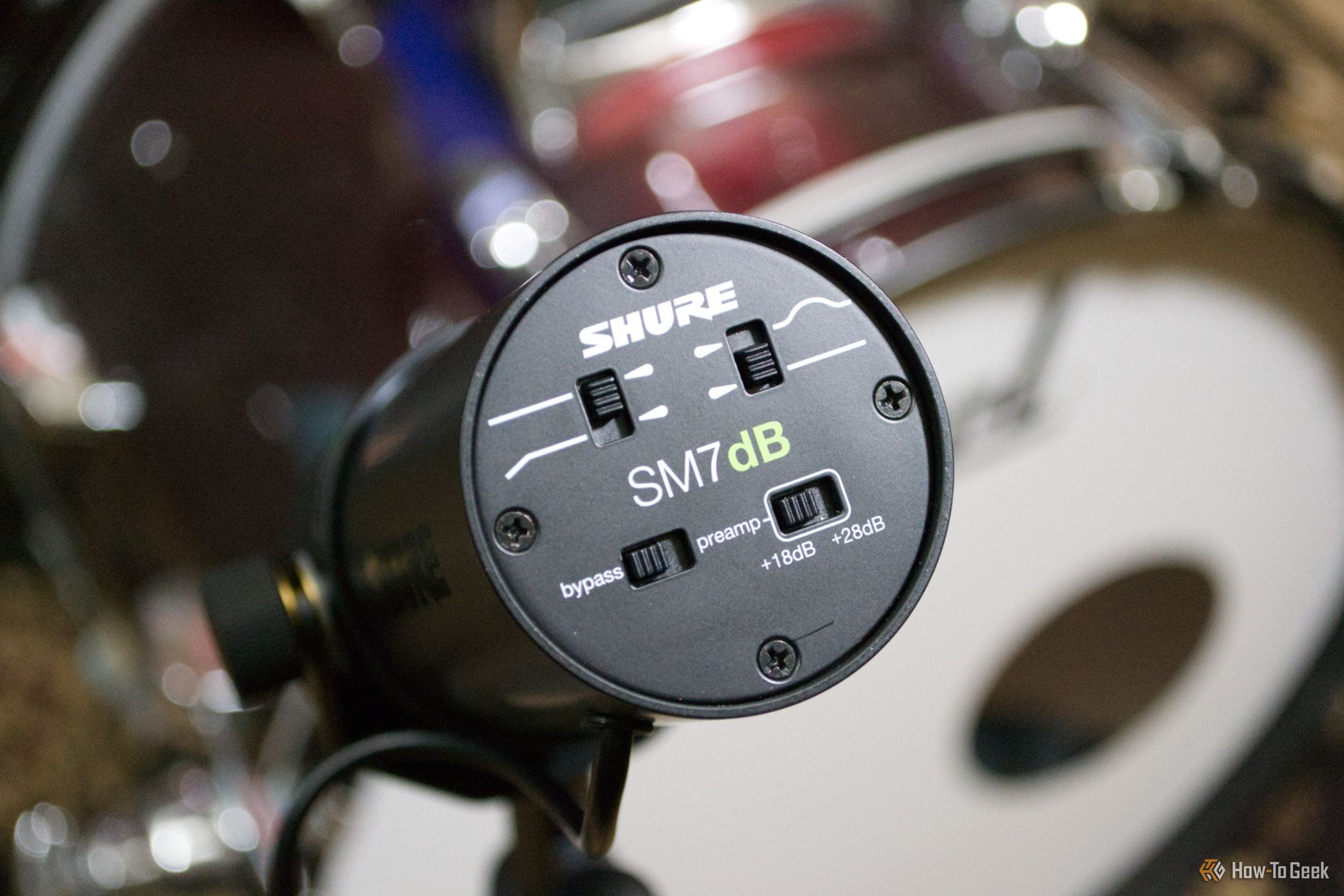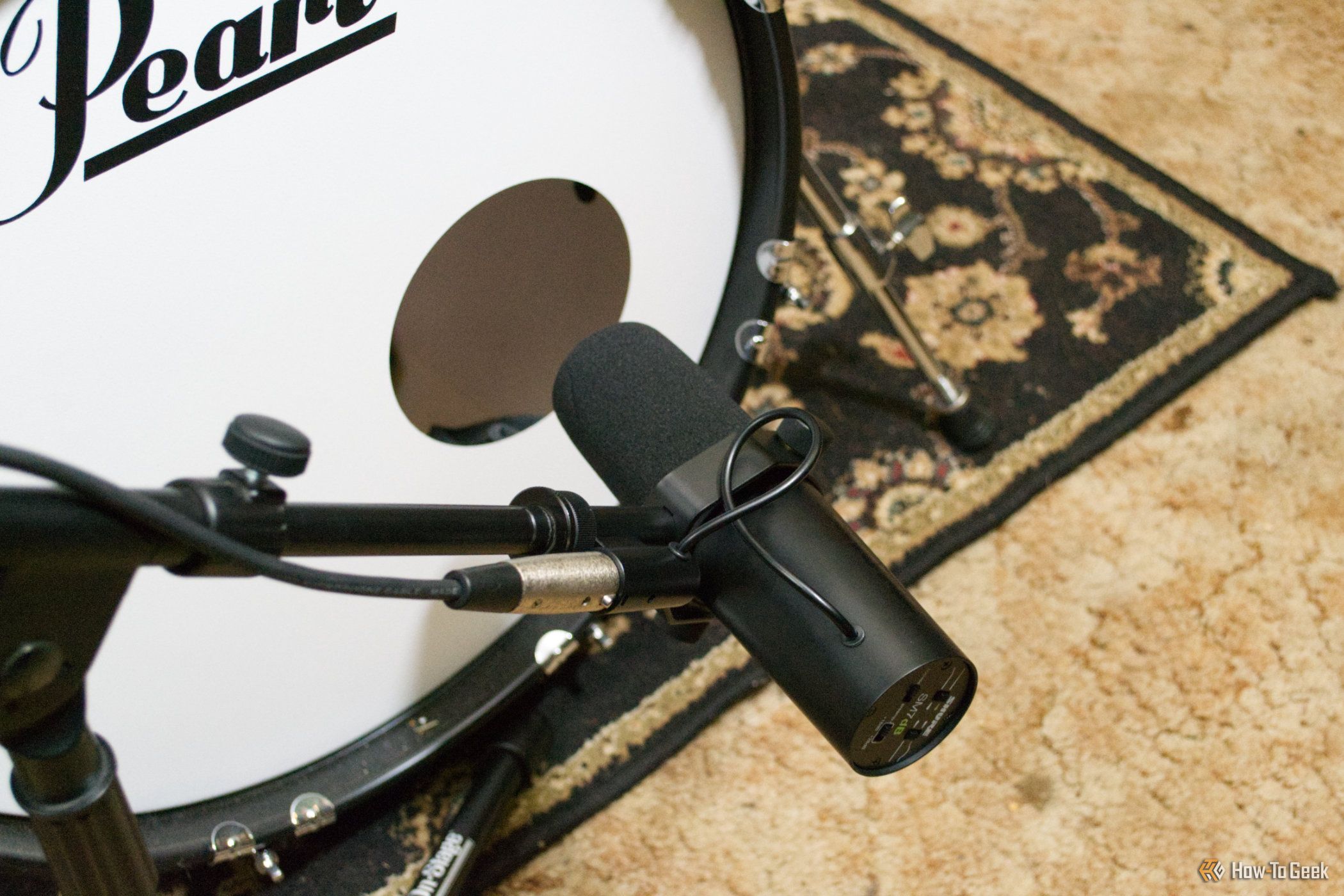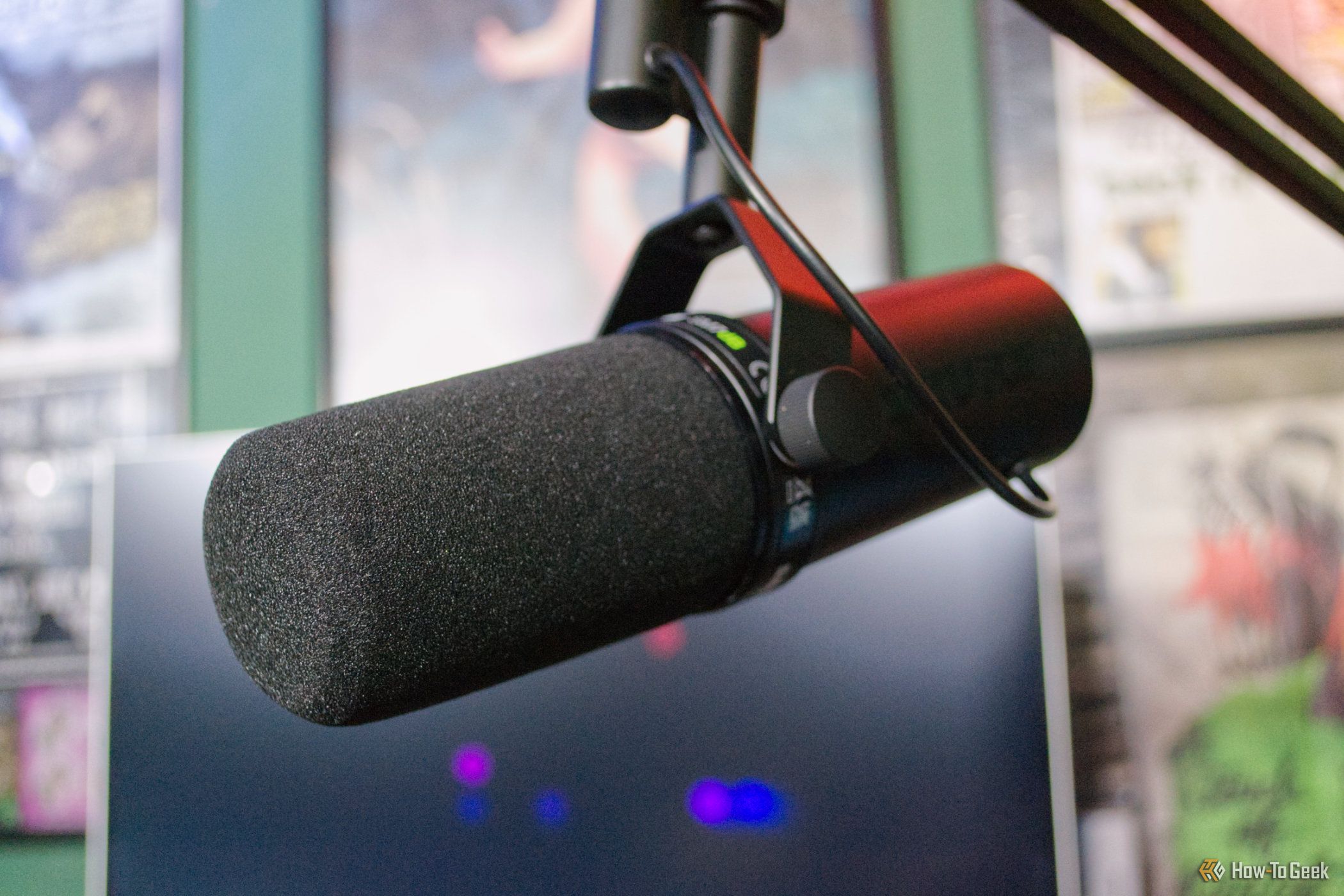Key Takeaways
- Shure SM7dB is a versatile, high-quality microphone with a built-in preamp, making it easy to use with a consumer-grade audio interface.
- The microphone has a sturdy build, flexible mounting options, and user-friendly onboard controls.
- The sound quality of the SM7dB is excellent for vocals, voiceovers, and other applications, with the preamp adding extra volume to the signal. However, the microphone comes with a hefty price tag.
Whether you’re streaming, podcasting, or producing music, ask around for the best mic for the job, and someone is bound to recommend the Shure SM7b. That said, that mic is more at home in a pro studio than it is in your home office, which is precisely the reason behind the new Shure SM7dB.
Like the original SM7, the SM7b is a large diaphragm dynamic mic, which makes it great at picking up the frequencies of the human voice. That said, its output is low, meaning if you want to use it with a lower-end audio interface, you’ll need a third-party inline preamp, which adds to the cost and complexity. The new Shure SM7dB builds this type of preamp directly into the mic, making it easy for anyone to use.
While a built-in preamp might not sound like a huge deal, it’s the cherry on top of what is already a fantastic microphone. The only thing that could sway you from choosing the SM7dB is its rather hefty price tag.
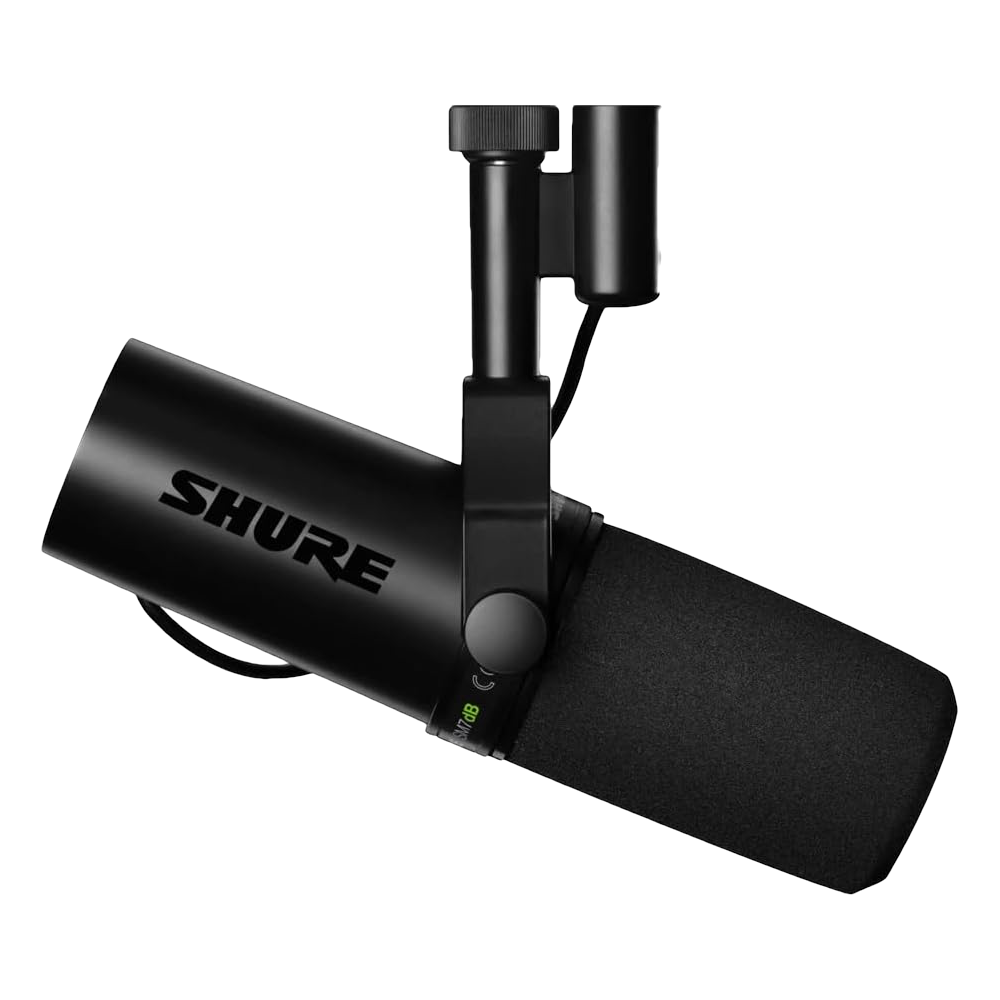

Shure SM7dB
The Shure SM7dB builds a preamp into the already great SM7b, making for one less thing you need to worry about before recording. This doesn't change the original mic, but simply augments it with a few extra features.
- Brand
- Shure
- Pattern
- Cardioid
- Power
- 48V Phantom Power
- Connector
- XLR
- Frequency Bandwidth
- 50 to 20,000 Hz
- Sensitivty
- -59dB, -41dB, -31dB
- Dimensions
- 8.07 x 3.86 x 5.87 inches
- Included Accessories
- Windscreen, Cable Tie
- High Pass Filter
- Yes
- Equivalent Noise
- -130 dBV
- Great-sounding microphone
- Built-in preamp means the mic works great with any interface
- Adjustable mounting options
- Built-in windscreen is great for streamers and podcasters
- Windscreen mounting options are confusing
- Expensive for beginner content creators
Sturdy Build and Flexible Mounting
If Shure is known for anything, it’s the rock-solid reliability of its products. During World War II, Shure spent a few years producing equipment for the United States military, which meant it had to be built to military spec. Once the war ended, Shure just kept on building that way, and the company hasn’t stopped.
That built quality is present in the SM7dB, and you can tell just by the feel of the microphone. While it’s newer, there aren’t many ways to tell the SM7dB from its predecessor without looking at the switches on the back of the mic. This is a good thing, as absolutely nothing was wrong with the look and feel of the SM7b.
Unlike many microphones, the SM7dB features a built-in mount. The mic comes preconfigured for use with a boom arm, which means that the microphone effectively hangs upside down. If you’re mounting the mic on a typical stand, you can reconfigure the microphone to orient this way, though this mainly just adjusts whether the switches on the back are upside-down from your perspective.
When adjusting the mic to mount on a typical stand, I had to try a few times to get everything properly tightened, but there is a simple guide in the online manual that shows you what to do. Removing the windscreen or replacing it with the included larger windscreen is not as easy because adding the larger one involves manually placing hook-and-loop fasteners on the mic body.
Connectivity: What You’ll Need to Use the SM7dB
While Shure does manufacture USB microphones, this isn’t one. It connects using the industry standard XLR connection, which means you’ll either need an audio interface or an XLR to USB adapter, which is itself a bare-bones audio interface.
Fortunately, any audio interface you happen to have should work, as long as it provides phantom power, which most interfaces do. This powers the built-in preamp, which you’ll likely need to get the microphone signal loud enough, especially if you’re using the microphone for streaming or other spoken content.
Onboard Controls: Tailor the Sound to the Source
If you’ve used an SM7b, most of the switches on the back will look familiar, though easier to get to. On that microphone, the switches were recessed to keep from accidentally moving them, so you needed a thin piece of metal or wood to adjust them. These switches stand proud and protrude from the metal body now, meaning you can easily adjust them with your fingers.
The new additions here are the controls for the built-in preamp. One switch enables or disables the preamp, while the other switch toggles between an 18dB boost or a 26dB boost. The other two switches are a presence boost and a low-end cut, both of which were present on the SM7b.
Unless you’re using an interface with auto-gain like the Focusrite 2i2 (Gen 4), you may need to adjust input gain to accommodate the jump in volume from the built-in preamp.
Sound Quality: A Classic For a Reason
There is a reason that the Shure SM7b was so popular for so many years, and all of that DNA made its way into the SM7dB. Sonically, the two microphones are identical, aside from the preamp in the SM7dB. Speaking of which, the preamp is made with tech licensed from Cloud Microphones, manufacturers of the Cloudlifter preamp that is so often paired with the SM7b.
Like the models that came before it, this is a large diaphragm dynamic microphone with a cardioid pickup pattern, effectively focusing on sound in front of it, rejecting sound from the rear and sides. The microphone is typically used for vocals and voiceover recordings, but the large diaphragm and ability to handle loud sounds also make it great for drums, guitar amps, and more.
Similarly to using a Cloudlifter or other inline preamp with the SM7b, engaging the preamp on the SM7dB adds some extra depth and presence, especially compared to a lower-end audio interface. While dynamic microphones are rarely transparent, the SM7dB doesn’t impart much of a character, aside from its proximity effect. This means that if you get closer to the mic, your voice will have more low-end frequencies.
The low cut and presence boost are both great tone-shaping tools to spice up dull sources or cut out unnecessary rumble. Keep in mind that, even though the buttons are now easier to adjust, these are largely “set and forget” settings, especially if you’re always going to be using the microphone for one purpose, like streaming.
It’s worth mentioning that the sound samples below are roughly gain-matched, so you’ll hear the difference in tone the preamp provides, but not the difference in volume.
Price and Availability
The Shure SM7dB retails for $499, exactly $100 more than the Shure SM7b. That may seem like a big jump, but if you were to buy an inline preamp like a Cloudlifter CL-1, you’d have to pay $149 just for the preamp, so this actually could end up costing you less.
You don’t even need to own an audio interface to use the SM7dB, as it’s available in a bundle with the Shure MVX2U XLR to USB adapter, which is effectively a simple audio interface. If you need a boom arm to use for streaming or podcasting, you can also get a bundle that contains the SM7dB and a Gator boom arm.
On the other hand, if you’ve already got a high-end preamp or audio interface at home, you may have enough clean gain to use the original Shure SM7b alone. If that’s the case, buying the original could save you some money.
Should You Buy the Shure SM7dB?
Like the SM7 and SM7b before it, the Shure SM7dB is a great-sounding microphone that is built like a tank. It can do everything the SM7b can do, but the added layer of flexibility means it’s even easier to reach for this mic over others in your collection. The human voice is its strong suit, but the microphone is also great for plenty of other use cases.
The built-in preamp is the only major new feature here, compared to the SM7b, and it’s such a good idea it’s surprising that Shure didn't release this microphone before 2023. That said, it’s better late than never, and the microphone is better off for the inclusion of the inline preamp, even if you don’t find yourself using it all that often.
Obviously, no microphone is perfect for every application, but like many Shure microphones, the SM7dB is no one-trick pony. If you’re looking for a downside, the only major one is the relatively high price. That said, if you can afford this microphone, and it’s right for your needs, you’ll be hard-pressed to find a better, more reliable option for the money.


Shure SM7dB
The Shure SM7dB builds a preamp into the already great SM7b, making for one less thing you need to worry about before recording. This doesn't change the original mic, but simply augments it with a few extra features.
- Brand
- Shure
- Pattern
- Cardioid
- Power
- 48V Phantom Power
- Connector
- XLR
- Frequency Bandwidth
- 50 to 20,000 Hz
- Sensitivty
- -59dB, -41dB, -31dB
- Dimensions
- 8.07 x 3.86 x 5.87 inches
- Included Accessories
- Windscreen, Cable Tie
- High Pass Filter
- Yes
- Equivalent Noise
- -130 dBV

